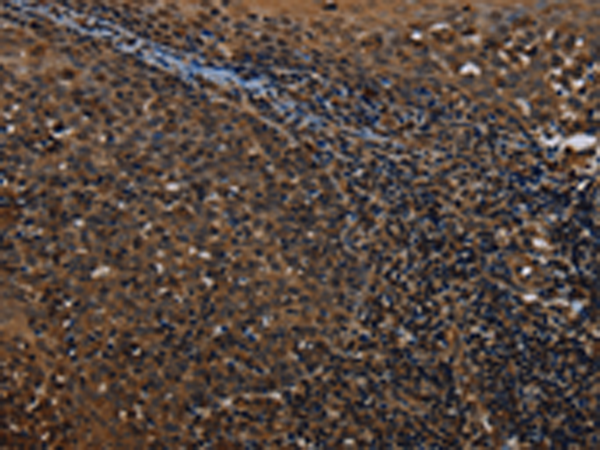

| WB | 咨询技术 | Human,Mouse,Rat |
| IF | 咨询技术 | Human,Mouse,Rat |
| IHC | 1/50-1/200 | Human,Mouse,Rat |
| ICC | 技术咨询 | Human,Mouse,Rat |
| FCM | 咨询技术 | Human,Mouse,Rat |
| Elisa | 1/1000-1/2000 | Human,Mouse,Rat |
| Aliases | OMGP |
| WB Predicted band size | 50 kDa |
| Host/Isotype | Rabbit IgG |
| Antibody Type | Primary antibody |
| Storage | Store at 4°C short term. Aliquot and store at -20°C long term. Avoid freeze/thaw cycles. |
| Species Reactivity | Human, Mouse |
| Immunogen | Synthetic peptide of human OMG |
| Formulation | Purified antibody in PBS with 0.05% sodium azide and 50% glycerol. |
+ +
以下是关于抗髓鞘少突胶质细胞糖蛋白(MOG)抗体的参考文献(注:OMG可能是拼写误差,此处按MOG抗体整理):
---
1. **标题**:*MOG antibody-associated encephalomyelitis: Clinical and MRI characteristics*
**作者**:Reindl M, et al.
**摘要**:探讨抗MOG抗体在中枢神经系统脱髓鞘疾病中的临床意义,强调其与多发性硬化症(MS)及视神经脊髓炎谱系疾病(NMOSD)的差异,包括独特的MRI病灶分布和治疗反应。
2. **标题**:*Clinical course of children with acute disseminated encephalomyelitis and MOG antibodies*
**作者**:Hacohen Y, et al.
**摘要**:研究儿童急性播散性脑脊髓炎(ADEM)患者中抗MOG抗体的阳性率,发现抗体阳性与单相病程相关,长期神经功能预后较好,但部分患儿可能出现非MS样复发。
3. **标题**:*MOG-IgG in NMOSD and related disorders: A multicenter study*
**作者**:Jarius S, et al.
**摘要**:多中心研究比较抗MOG抗体与抗AQP4抗体阳性患者的临床特征,指出MOG抗体相关疾病更易累及视神经和脊髓,且对激素治疗反应更佳。
4. **标题**:*Relapsing demyelinating syndromes in MOG-positive patients: A cohort study*
**作者**:Ramanathan S, et al.
**摘要**:描述抗MOG抗体阳性患者的复发缓解型病程,提出部分患者可能发展为独立于MS和NMOSD的疾病实体,需个体化治疗策略。
---
**注**:若“OMG抗体”指其他特定抗体(如卵巢抗苗勒管激素相关),请提供更多背景信息以便调整。
The oligodendrocyte myelin glycoprotein (OMG) antibody is associated with autoimmune responses targeting myelin in the central nervous system (CNS). OMG, a glycoprotein expressed on oligodendrocytes and myelin sheaths, plays a role in axon guidance and myelination. Initially identified in the 1990s, OMG became a focus in neuroimmunology due to its potential link to demyelinating disorders like multiple sclerosis (MS). Autoantibodies against OMG are thought to contribute to myelin destruction by triggering immune-mediated attacks, disrupting nerve signal transmission.
Research highlights OMG antibodies in a subset of MS patients and other CNS inflammatory conditions, though their pathogenic role remains debated. Unlike well-characterized targets like myelin basic protein (MBP) or myelin oligodendrocyte glycoprotein (MOG), OMG antibodies are less studied, partly due to overlapping epitopes with other myelin antigens. Animal models show that OMG-specific antibodies can induce demyelination, supporting their potential involvement in autoimmune mechanisms.
Recent studies explore OMG antibodies as diagnostic or prognostic biomarkers, particularly in atypical demyelinating cases. However, clinical utility is limited by variability in detection methods and inconsistent associations across patient cohorts. Current investigations also aim to clarify whether OMG antibodies are primary drivers of disease or secondary markers of myelin damage. Therapeutic strategies targeting OMG, such as B-cell depletion or antibody-neutralizing approaches, remain experimental but may hold promise for personalized treatments in neuroinflammatory disorders.
×